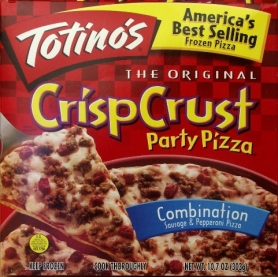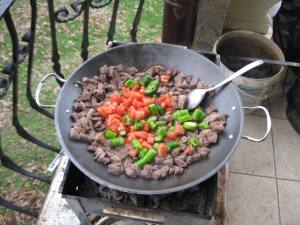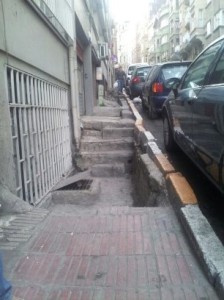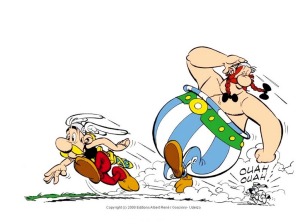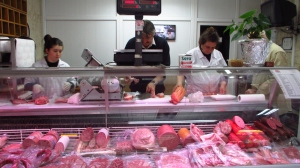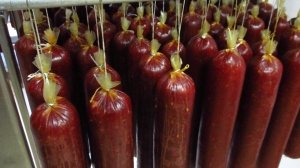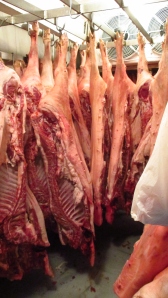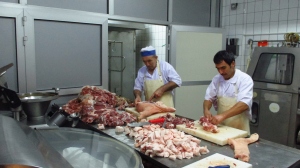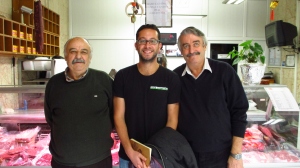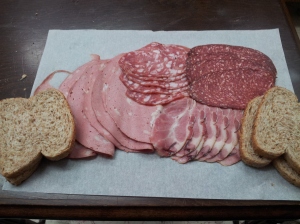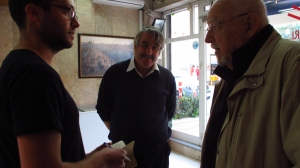Yes, you CAN buy pork in Turkey. It’s not easy, convenient, nor socially-accepted, so you kind of have to buy it and shame-eat, like what I do with Totino’s Party Pizza.
To get your hands on pork, however, you have to be in the most Westernized parts of Turkey, like İstanbul, İzmir, and down the Aegean-Mediterranean coast. Some of the Fulbright English Teaching Assistants, stationed in the deep-reaches of Anatolia, far from easy access to life staples such as pork and booze, visited İzmir for the first time a few weeks ago and were smitten. They took to calling it “Jizz-mir,” which I really should have thought of twenty years ago.
Important note: there is a way to get pork through non-commercial channels. Lots of people hunt wild boar in Turkey, and if you get an in with some hunters, they’d gladly sell or gift you the carcass. If you need help breaking the boar, gimme a call!
The southwestern towns in Turkey (Çeşme, Marmaris, Fethiye, Antalya, Bodrum, e.g.) have enough English, German, Spanish and Russian tourists to sustain pork availability at restaurants and a few grocery stores. The Migros stores in İzmir have a small and sad selection of pork products, just above the eggs.
My family comes from İzmir , which has a long history of being a melting pot. Actually, I don’t think I’ve ever seen a Turkish household kitchen with a “melting pot.” Let’s call it a “saç tavası” of cultures. From what I’ve gathered, my own heritage is Greek, Balkan, Jewish, i.e. Aegean-Mediterranean, BUT NO GYPSY THANK GOD (just kidding, please don’t steal my wallet).
It’s interesting how centuries of immigration, warfare, assimilation, and admixture are summed up as food analogies: “America is a mixing bowl,” my grade school teachers would declare, reflecting the tail-end of early 20th Century philosophy on new Americans assimilating (read: “acting more like a now-accepted white ethnic group”), abandoning their parents’ language, and learning about weird white person shit like advent calendars, James Spader, and cotillion balls.
Soon after, in school we were taught to emphasize multiculturalism. The mixing bowl was put back in the pantry. My parents wrote impassioned letters to Yankee Ridge Elementary School on behalf of all the immigrant families that DIDN’T celebrate the birth of Jeebus. Time to teach “America is a fruit salad!” We’re a mixture that celebrates our individual components! Hooray!
The analogy is a noble one, save for the fact that fruit salad is gross. You end up eating only the bananas and the kiwi, while ignoring the tannin-bomb grapes, which inevitably roll off your church-basement-quality paper plate. The cantaloupes are always rock hard, the strawberries white and tart. Paella! Now there’s a multicultural food analogy I can get behind, Lena Dunham’s idiocy about the dish be damned!
I don’t hang out much in elementary schools as much anymore (THANKS A LOT, MEGAN’S LAW), so I can only guess that what they’re teaching is some sort of “America is a farm-to-table, neo-liberal/pro-business, domestic partnership!”
So basically, Duck Dynasty, but without all the backwoods buttfucking.
People are often pejoratively described as a product of what they eat. Beaners, Fish-heads, aaaaaaaand I should stop listing racial slurs. Not adhering to a perceived cultural norm leads to more food analogies: coconuts and Oreo cookies, for example, used for minorities engaging in “white” behavior.
You can see such judgmental food forces at play in Turkey. The idea of pollution stemming from pork, a taboo meat in Islam, has potentially influenced (I would argue) Muslim Turkish views on Turkish ethnic minorities. I have to be cautious of discussing pork butchery with every Tom, Dick, and Harry Turgay, Deniz, and Hakan, because I’ve seen people physically recoil and shudder (no, REALLY, they FLINCH!) at the thought of touching and eating a pig.
THE LAST PORK BUTCHER SHOP IN TURKEY
Mary and I were in İstanbul to shepherd our three friends around the major must-see sites (Aya Sofya, Blue Mosque, Grand Bazaar, the Cistern, İstiklal Caddesi) and after they left I had one solid day to do some research. I had been meaning to visit the last remaining pork butcher shop in Turkey, located a mere 15 minute walk from our AirBNB flat. Hearing about the shop was like hearing reports of a unicorn. People thought I was lying when I spoke of the Kozmaoğlu brothers’ butcher shop.
Once you get off İstiklal and head north two blocks, tourists and boutique stores disappear. We strolled through narrow winding streets, tire shops, and over a dusty overpass. The butcher shop is not on a main street; it’s tucked across a Petrol Ofisi gas station, with only a red-lettered “Ideal Salam Kozmaoğlu ” indicating you’ve come to the right place.
We walked in and I recognized the two Kozmaoğlu brothers, Kozma and Lazari, from the website. Lazari, the older brother, and founder of the shop, was short, bald, and had a moustache that made him look like an Asterix and Obelix character. Kozma had mid-length gray hair, a similar moustache, and a lazy eye. They both looked…Greek. I noticed that their jaws, eye orbit shapes, and noses differed greatly from the general craniofacial characteristics of older Muslim Turkish males.
The guys were sitting and chatting in the back while two women were standing and working in the front. Classic Turkish style! The older woman was slicing charcuterie into neat overlapping piles; while the younger one was vacuum-sealing the meat stacks. I’m going to conservatively estimate that the vacuum sealer put out a decibel equivalent to a harrier jet raping a banshee in an echo chamber.
Cold call ethnography always feels like you’re approaching a lady at a bar; you’re trying to come across as nice, trustworthy, interested, and not creepy. Mary has observed a lot of my Turkish interview transactions (the ethnography part, not the approaching women in a bar part), and cogently observed that flattery is the key. Come out and say you’re a fan, or you love some aspect of what the person approached is doing, and it softens the cold interaction. My problem is, I LOVE what the Kozmaoğlu brothers are doing, but the way I show that interest comes out as “ZOMG TELL ME EVERYTHING ABOUT WHAT YOU DO EAT MEAT REPEAT NOM NOM NOM NOM!!!!!” Needless to say, I usually get a look usually reserved for golden retrievers humping pants.
I gave the brothers my spiel: researcher, food, meat, anthro, US-born Turk. The shop was really quiet, and then punctuated with disorienting noise of the vacuum sealer. I was standing in front talking to a tough crowd for what seemed like hours. My hair started to itch and I desperately needed to remove my jacket. I felt like I was bombing on stage.
I went right into some specific questions: Where was the meat from? Any flak from Erdoğan-supporting beardos and their head-squeezer wives? I got half-squinted eyes and monosyllabic responses. I blathered on a bit more. They asked specifically where I was from, which in Turkey means “where is your family from?” Aka: “I need to make sure you’re not a religious weirdo who intends to fuck with my business.”
“Uh, my family’s from İzmir , but I’m a dual citizen who is here to do some res– “
“İZMIR !” exclaimed Kozma. “The land of foreigners, infidels and people who drink booze!” He smiled and nodded knowingly at Lazari.
“Yes’m.”
“But you don’t SOUND Turkish; you sound like a JEW!” (Funny, Mel Gibson said the same thing to me once!)
“Ummm, thanks? I’m actually American, but you know…Turkish as well?” Oh Christ, was I really practicing Turkish uptalk?
“PFFFFFF, Lazari, lookit this guy, he’s an AMERICAN! Lemme show you around!”
I had the room! They rose from their chairs and approached the counter. The women, who I later learned were Kozma’s wife and daughter, stopped their pretense of fake-working in order to eavesdrop and openly listened.
The identification rigmarole is a necessary part of owning a shop dedicated to selling a meat perceived as filthy and sinful by the majority population, as well as prevention against sketchy journalists looking to rile up the masses. There never was much freedom of the press in Turkey to begin with, and lately there have been mass firings and “ideological adjustments” (euphemism alert!) at prominent newspapers. It’s quite common for a CHP-supporting left-wing Turk to lament the “fall” of a certain newspaper after Erdogan’s AKP had an editor sacked and replaced with a sycophant. I’ve also been hearing a lot about “kaçak et” (illegal/smuggled meat) in Turkey, which is often horse or pig meat being driven in from Europe and sold to hotels and restaurants. (Meat is quite expensive in Turkey). Understandably, this has caused a huge public outcry, and for the meat industry in Turkey, any press tends to be bad press.
Kozma took us on a very quick tour of the huge shop. We barely had time to snap pictures of the three floors, a huge walk-in, a massive sucuk-curing room, and a locker room with laundry and shower facilities. Whole-animal butchery has a strong visual component in the United States; people want to watch a butcher break down an animal because it symbolizes openness and a gesture that all questions and observations are on the table (literally). There’s a performance and a transparency that the American Slow Food consumer demands, because the industrial American food system deals in monoculture, suffering, and corporate welfare. (Food festivals will often celebrate the visual component of butchery, where teams compete to see who can break down an animal the fastest and make the nicest looking assemblage. I don’t really give a fuck about speed butchery, but it’s still amazing to watch Martin Yan break down a chicken in 14 seconds, or Oscar Yedra bone out an entire chuck in 30 seconds.)
At the Kozmaoğlu shop, the breaking all happened out of sight, in the basement, by two unsmiling guys. I asked what they did with the neatly-separated bones and the fat. Kozma said they threw it all away, save for some fat and skin that went into the charcuterie. It’s not that the brothers are blind to the value-added potential of roasting bones for stock, or rendering fat for lard, but there’s absolutely no market for it. Another hurdle: since none of the Muslim employees are willing to taste the charcuterie, Kozma has to make all of it. His product is fantastic, but it doesn’t give him much time off from work. (For his wedding and his mother’s funeral, Kozma went to work right after).
After the tour Kozma invited us to sit down behind the counter. The brothers are Christian Turks, from an ethnic minority in Turkey known as Rumeli. Lazari, the older brother, answered the phone at one point and took an order in fluent Greek. I feel a little overwhelmed at the diversity I encounter on a daily basis in Turkey. My own Turkishness feels diluted, as though even if I were born and raised in Turkey, I’d still have a hard time understanding the cultural day-to-day of Anatolia. Much of that, of course, is that secular Turkey INTENTIONALLY distanced itself from the religious whackjobs*, so I never had any experience from my family.
As a rule, unfortunately, life is harder for ethnic minorities. The brothers didn’t disguise their resentment towards societal prejudice of their profession. I asked where their family was from, and they said İstanbul, by way of Nevşehir. (Nevşehir province is home to world-famous Kapadokya). Kozma said he was tired of people asking where they were “really” from, since he points out that his family has been in Anatolia longer than most. “When people ask me where I’m from,” he said, “I usually just say ‘my mom’s pussy.’”
TOTALLY stealing that, btw.
The brothers lamented the loss of Christian butcher shops in İstanbul. There used to be eight shops in İstanbul alone that sold pork. One by one, they closed; some from family mismanagement, but most from the structural societal pressure that emphasized pork as sinful. Whole animal butchery is a disappearing trade worldwide, but pork butchery in Turkey faces an extra level of negative selective pressure: there are no trade schools teaching pork butchery, so all this: the store, the ethnic minority expression of valuable food culture; seems destined to disappear when the brothers retire.
I mentioned that I would be traveling east for my meat research, to cities such as Gaziantep and Urfa, and Kozma got irritated:
“Fuck that! Why would you want to go east?! They kill sheep in shit and dirt and then eat it.”
I didn’t feel like mentioning that I had done exactly that a few weeks ago, for the Feast of the Sacrifice. As with most prejudices, they don’t run in one direction.
We chatted for an hour more or so. I was hungry and my brain fried from information overload. I made the mistake of saying we needed to leave to get something to eat.
“You’re hungry? Why didn’t you SAY so?” Kozma asked his wife to slice us mortadella, sopressata, and pretty much anything in the case. He grabbed some bread and put a jar of spicy mustard in front of us.
Lazari chimed in: “Imagine having a tall beer or a glass of rakı with all that!”
Well yes, obviously, that would be delicious.
We ate like kings. Their charcuterie was so well done I felt bad that no one in Turkey was giving them the respect they deserved.
Customers filtered in and bought their smoked pork shoulder, their speck, and their bacon. Men in chef’s coats came in to pick up restaurant orders. Once we finished eating, we bought several pounds of bacon**, and some of what we had just eaten. We said our goodbyes, and promised to be back.
If you’re in İstanbul, make a trip to the shop! Tell that pork-starved Italian lady you’ve been scamming on to follow you to a fun secret location***. Buy some charcuterie, two bottles of wine (which they also sell), and go have a picnic in Gezi Park. There, I just did all the legwork to get you laid awkwardly in your hostel while four strangers are forced to listen.
Make sure to call first, especially on the weekends, as they sometimes close early without notice. Click on the “Ulaşım” tab for a map to the shop.
*Redundant
**The bacon was great, since we haven’t had any in so long, but it was more like salt pork, as Kozma doesn’t use any sugar in his bacon cure. It was sliced a little thin, so it cooked up similar to what Commonwealth countries would call “rashers.” Made for a fantastic BLT, though!
***Don’t make it sound rapey, obviously.
Thanks always to Mary H. Brown for the photographs! Go look at her blog right now! http://blotsee.wordpress.com/
